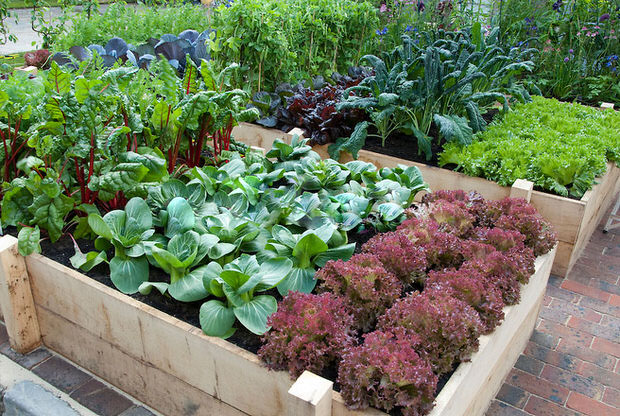






If you want a great vegetable garden you need to use raised garden beds. Raised beds are great for growing healthy, productive vegetables and flowers and they’re easy to make.
Making a raised bed is a simple bit of carpentry that anyone should be able to do. The easiest way to buy some 2×12 lumber and screw them together in the shape of a rectangle. You can make them as long as you like but you should limit the width to 3 or 4 feet so you can easily reach in the bed to plant seeds, pull weeds or to harvest crops.
The next question you’re probably asking is what kind of wood do I use to build raised beds. The whole pressure treated vs. non issue is a complicated one. Does pressure treated wood leach chemicals into the soil? Well the answers are yes and maybe.
The old pressure treated lumber (CCA) is preserved with a process that uses arsenic. Obviously you don’t want arsenic anywhere near something you’re going to eat even in the small amounts that might be present in a raised bed vegetable garden. CCA wood isn’t too readily available anymore so you probably don’t have to worry about coming across it. The new improved pressure treated wood (ACQ) replace CCA pressure treated wood a few years ago. The lumber industry says it safer to handle and use but guess what? It eats through normal galvanized screws and fasteners. You have to use stainless steel screws with ACQ wood. I’m not an expert with lumber or chemicals but that sounds like something that shouldn’t be near my vegetables.
I think I’ll avoid all pressure treated wood until some long term studies are done.
Naturally rot resistant woods like cedar and redwood are great for building raised beds. But cedar and redwood are expensive. You could also use regular non-pressure treated lumber but just be aware that the wood will probably rot in a few years. It’s inexpensive enough that it shouldn’t be an issue.
If you plan on growing vegetables or flowers in your yard this year, why not try growing them in raised garden beds.
Article By Anthony Tripodi. When Anthony Tripodi isn’t gardening, he’s working on various garden projects and writing about them on his blog, http://compostbin.blogspot.com
Copyright © www.100flowers.win Botanic Garden All Rights Reserved